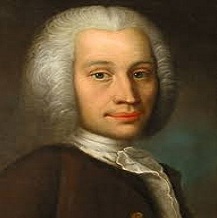Anders Celsius Inventor of Temperature Scale

Biography of Anders Celsius
Early Life
Anders Celsius was an astronomer who was born on 27 November, 1701 in Uppsala Sweden. His father, named as Nils Celsius was also an astronomy professor who was teaching in his hometown. He got his education from his hometown which was situated in north of Stockholm. He was extraordinarily brilliant in mathematics from very young age. After getting his early education he studied further at Uppsala University. He started a job as an astronomy professor in the same university like his father in 1730.
Achievements
Anders Celsius wanted to make an astronomical observatory laboratory and for this purpose he visited many famous sites in between the years from 1732 to 1734. A kind of dispute rose in the same years when English and French astronomers were having different ideas regarding the shape of earth. To resolve this issue, they were sent to the ends of the world to measure it correctly and more cleanly. Celsius joined a famous astronomer in this expedition as his assistant. This process started in 1736 and continued till 1737. The theory of Newton about earth was proved significantly in 1744 after all kinds of researches. Anders Celsius also played a great role in this whole expedition.
Contributions
He migrated back to Uppsala after that expedition. On the other hand, he made many unique contributions in the field of physics and some of them are really remarkable. He was the first scientist who stated and analyzed that the earth changes its magnetic field at the time of northern light and it assesses the light of the stars.
Inventor of Celsius Scale
Celsius was the one of them who said that a thermometer should have mercury as a liquid in who can bear an air pressure of 760 mm and its division should be 100 in number. The boiling point of water was taken as 100 degree centigrade while freezing point was considered as the 0. His processes of elaborate fixation and measuring environment and methods led this scale to be the largest used and most important scales in the temperature world as compared to Fahrenheit and Kelvin scale.
Death
He was the one who was a serious believer of Georgian calendar which was taken practically in 1753 in Sweden. He died on April 25, 1744 in Uppsala, Sweden and at the time of death he was only 43 years old. The unit scale of temperature which was known as degree Celsius was named after his name as Celsius scale which was a tribute to the great scholar of physics.


Leave a Reply